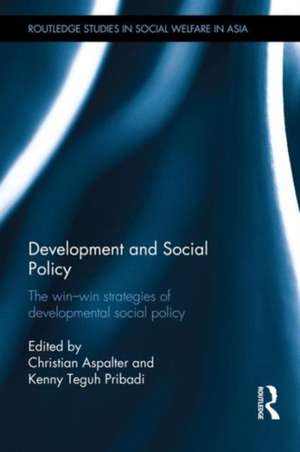Development and Social Policy: The Win-Win Strategies of Developmental Social Policy: Routledge Studies in Social Welfare in Asia
Editat de Christian Aspalter, Kenny Teguh Pribadien Limba Engleză Hardback – 14 iul 2016
This book provides win-win strategies for social policies on the ground, as developed and put forward by the normative theoretical paradigm of Developmental Social Policy (DSP). Taking the state-of-the-art general development theory as a starting point of reference and discussion, it goes on to discuss in detail the key win-win strategies that form the basis and core of the DSP paradigm. It examines key related issues such as the performance of provident fund systems, the performance of conditional cash transfer systems (especially their elements that are based on asset- and means-testing), universalism and extension in social security provision in the context of especially developing countries, and "non-economically targeted" social welfare benefits and services.
Providing fully-fledged theoretical guidance paired with key social policy strategies and solutions, it will be highly valuable for students and scholars of social policy, development studies, and Asia Pacific studies.
| Toate formatele și edițiile | Preț | Express |
|---|---|---|
| Paperback (1) | 416.22 lei 6-8 săpt. | |
| Taylor & Francis – 17 ian 2019 | 416.22 lei 6-8 săpt. | |
| Hardback (1) | 1054.71 lei 6-8 săpt. | |
| Taylor & Francis – 14 iul 2016 | 1054.71 lei 6-8 săpt. |
Preț: 1054.71 lei
Preț vechi: 1286.24 lei
-18% Nou
Puncte Express: 1582
Preț estimativ în valută:
201.83€ • 211.68$ • 168.01£
201.83€ • 211.68$ • 168.01£
Carte tipărită la comandă
Livrare economică 01-15 aprilie
Preluare comenzi: 021 569.72.76
Specificații
ISBN-13: 9781138186576
ISBN-10: 1138186570
Pagini: 224
Ilustrații: 20
Dimensiuni: 156 x 234 x 18 mm
Greutate: 0.45 kg
Ediția:1
Editura: Taylor & Francis
Colecția Routledge
Seria Routledge Studies in Social Welfare in Asia
Locul publicării:Oxford, United Kingdom
ISBN-10: 1138186570
Pagini: 224
Ilustrații: 20
Dimensiuni: 156 x 234 x 18 mm
Greutate: 0.45 kg
Ediția:1
Editura: Taylor & Francis
Colecția Routledge
Seria Routledge Studies in Social Welfare in Asia
Locul publicării:Oxford, United Kingdom
Public țintă
Postgraduate and UndergraduateCuprins
PART I: Introductory Part 1. Introduction PART II: Theoretical Part 2. General Theories of Development Economics 3. Developmental Social Policy: Theory and Implementation PART III: In-Depth Case Studies 4. Evaluating Conditional Cash Transfer Systems: The Case of Latin America and the Caribbean 5. Geography Targeting and Poverty Reduction: The Case of Thailand 6. Evaluating the Performance of Provident Fund Systems: The Case of Singapore 7. Universalization of Social Security Systems: The Case of China 8. The Extension of Social Security Systems: The Case of Indonesia PART IV: Concluding Part 9. Development and Social Policy: A Way Forward for Developmental Social Policy
Notă biografică
Christian Aspalter is Professor of Social Policy at Beijing Normal University-Hong Kong Baptist University United International College, China.
Kenny Teguh Pribadi is adjunct faculty at Catholic University of Soegijopranoto, Indonesia and former faculty at Beijing Normal University-Hong Kong Baptist University United International College, China, both in the field of economics.
Kenny Teguh Pribadi is adjunct faculty at Catholic University of Soegijopranoto, Indonesia and former faculty at Beijing Normal University-Hong Kong Baptist University United International College, China, both in the field of economics.
Descriere
This book provides win-win strategies for social policies on the ground, as developed and put forward by the normative theoretical paradigm of Developmental Social Policy. Taking the state-of-the-art general development theory as a starting point of reference and discussion, it goes on to discuss in detail the key win-win strategies that form the basis and core of the DSP paradigm. It examines key related issues like the performance of provident fund systems, the performance of conditional cash transfer systems, universalism and extension in social security provision in the context of especially developing countries, and "non-economically targeted" social welfare benefits and services.


















